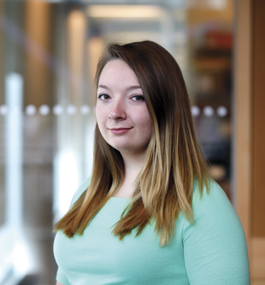Tracking Jihadists, Point by Point

Mike Lovett
Katy Dowling
by Laura Gardner, P'12
Katy Dowling ’15 has never watched “Homeland,” the Showtime series about a bipolar terror-fighting CIA agent, perhaps because Dowling is as levelheaded as “Homeland” heroine Carrie Mathison is loony.
So it’s reassuring to know that Dowling may one day be Carrie’s real-life counterpart. Majoring in politics, and Islamic and Middle Eastern studies, the Warwick, N.Y., native is acquiring the knowhow to become a successful counterterrorism agent inside the FBI, the National Security Agency or Homeland Security.
Dowling works with Professor Jytte Klausen on the Western Jihadism Project. For approximately 20 hours every week, she investigates jihadist networks active in Syria and Iraq, poring over indictments, warrants and other government documents, and following active terrorist social-media accounts. Using sophisticated statistical analysis, she then establishes relationships between seemingly disparate data points.
“We help pull together information on the connections between terrorist groups and between individual fighters in Syria and Iraq,” says Dowling. “We create portraits of Western jihadists in the U.S., Europe, Australia and New Zealand. We’re able to pinpoint exact steps in the radicalization process, such as when a young person withdraws from his family, starts to wear religious garb, and starts going to the mosque obsessively, for frequent, long visits.”
Dowling’s work with the project has helped her hone her counterterrorism credentials. She speaks and translates Arabic, and several other languages. She’s adept with software the U.S. government uses to analyze Western-based terror networks. And she’s gaining expertise on the emerging roles of women in ISIS and al-Qaida, a topic she’s exploring in her senior thesis.
“There is a feminist movement within ISIS that’s very active on social media, and that’s helping women build themselves into the organization,” Dowling says. “Men are still in charge, but the need for women to help secure the future of the Islamic State prevails over doctrine.”
Encouraged by her father and uncle, both of whom are police officers and first responders, Dowling has wanted to work in law enforcement and security since early high school. The Western Jihadism Project has helped her channel this interest into a focus on counterterrorism.
“I’ve learned the value of thinking analytically about media sources and government documents,” she says. “There’s no one terrorist profile. Terrorists come from a variety of backgrounds and have different motivations for becoming jihadists.”
Dowling won’t elaborate on her own ongoing recruitment by U.S. law-enforcement agencies, except to say it’s “intensive.”
